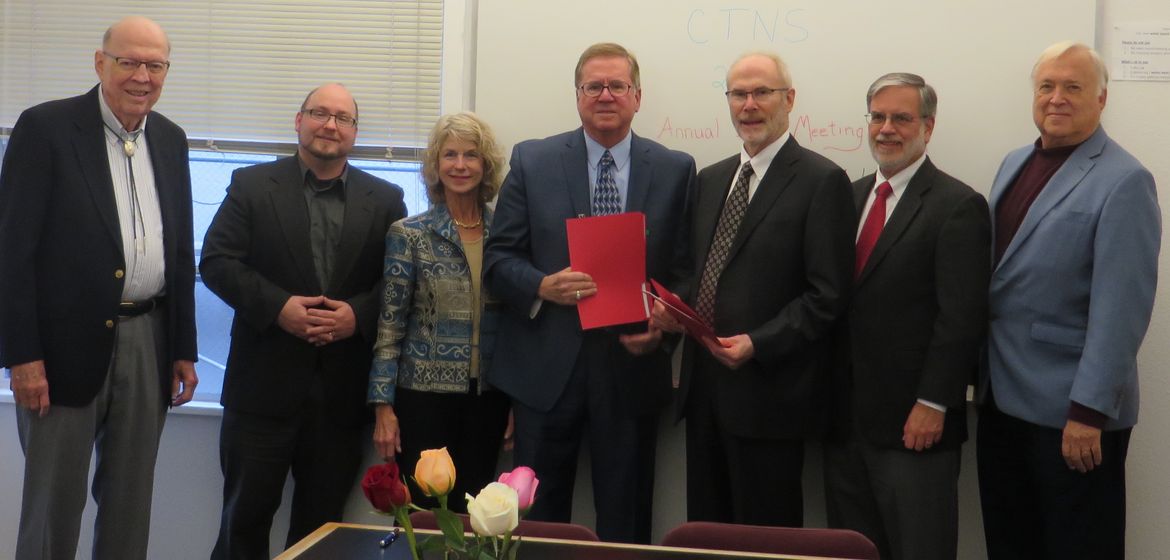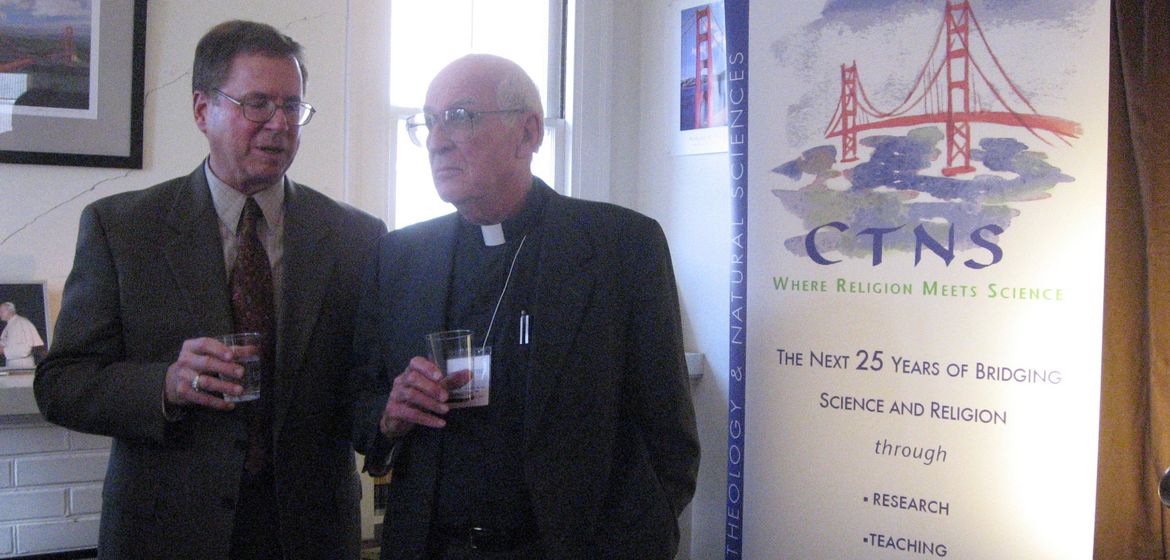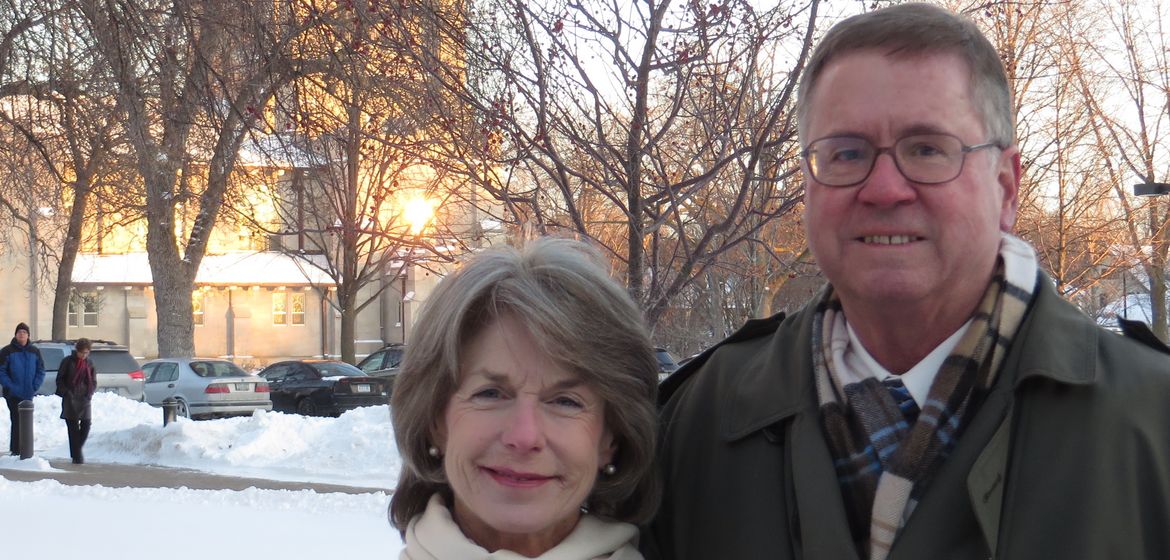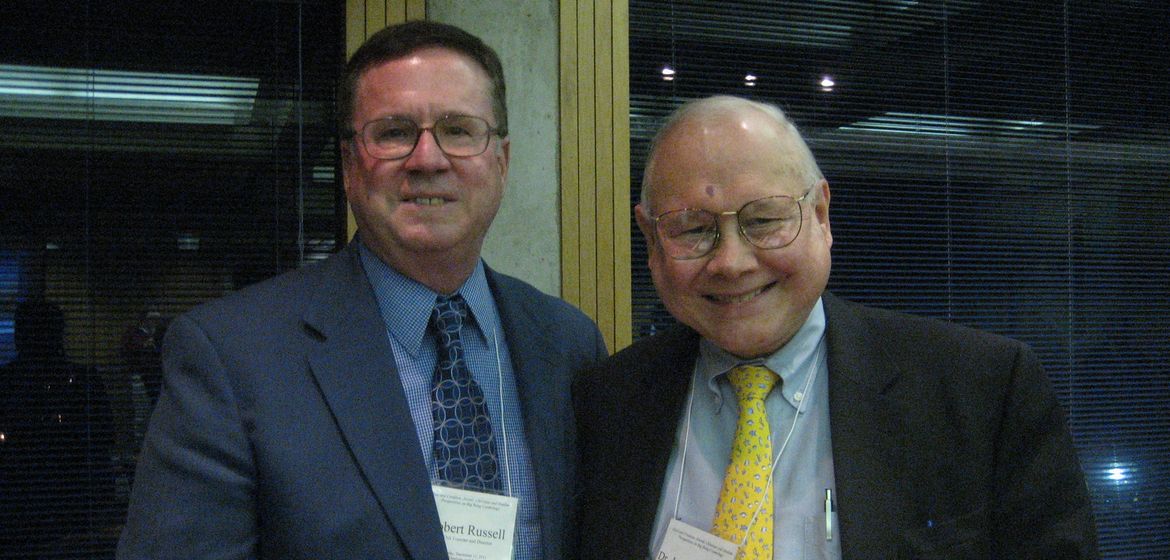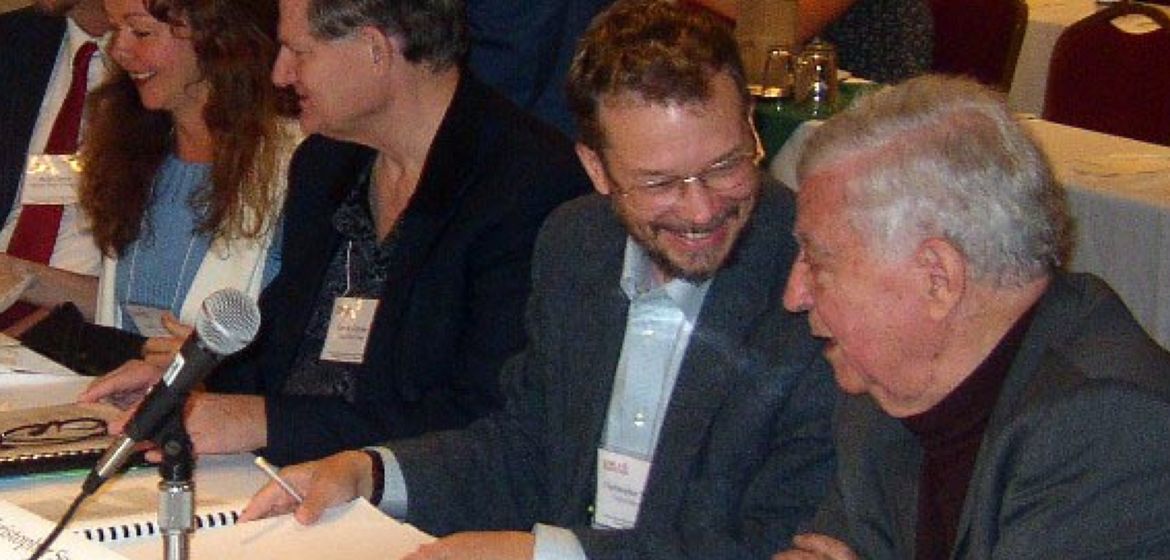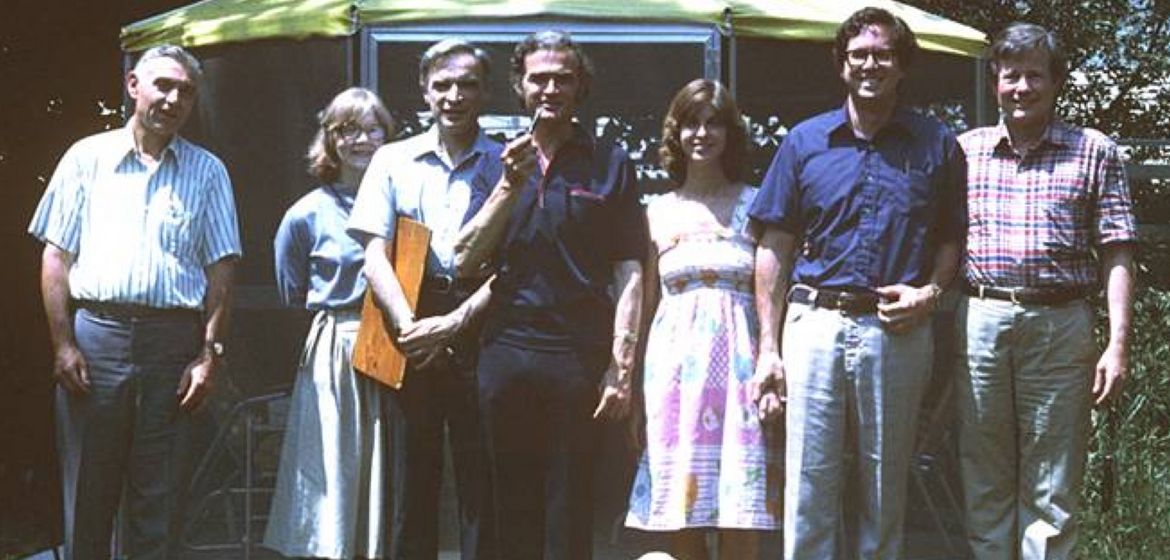Founded as a California non-profit corporation in 1981, the Center is now a program of the Graduate Theological Union, an ecumenical and interfaith consortium of seminaries and centers based in Berkeley, California. Interested individuals may fully participate in the dialog by becoming a member, receiving Theology and Science, the Center’s refereed journal, CTNS E-News, and other benefits.
The Center for Theology and the Natural Sciences: A Brief History
The Center for Theology and the Natural Sciences began as the personal vision of Robert John Russell. It became a reality because there are so many others who care about the contemporary relation between theology and science. Three years after Bob began a teaching career in physics at Carleton College, he called upon some of his most respected mentors to share his idea about starting a center focused on the interaction of science and theology. The center would 1) train future theologians and church leaders in key relations between theology and science; 2) provide resources for meeting present needs in churches and denominations as they awaken to the challenges of ministry in an age of science and technology; and 3) provide a public forum for scientists, technologists, clergy, theologians, ethicists, and the general public to carry on responsible discussion of moral and spiritual issues. The group encouraged Bob's plan and agreed that the ecumenical climate of the Graduate Theological Union (GTU) made it an ideal location for such a center. Thus, Bob moved his family to the Bay Area in 1981, and the Center was born. In 1982 it was legally incorporated as a non-profit organization.
Over time the Center has graduated from a modest one-person staff with a small membership roster to a Center that holds a position of international leadership and serves as an important resource for those who are involved in the interaction between theology and the natural sciences. Over the years CTNS has relied on the generous gifts of financial supporters who and which underwrote numerous projects. In 1989, CTNS began a long-term collaborative research project with the Vatican Observatory which involved an international team of philosophers, theologians, physicists and biologists. From this 20-year collaborative project, five research-level volumes on divine action have been written and published as well as a ‘capstone’ volume. (Chapter summaries are available on this site).
In 1991 the National Institutes of Health (NIH) funded a CTNS-sponsored three-year research project on ethical and theological implications of the Human Genome Initiative. The first NIH-sponsored grant awarded to a theological organization, this project supported cutting-edge research and resulted in the book, Genetics: Issues of Social Justice, edited by the project's principal investigator, Ted Peters.
One year later, The John Templeton Foundation supported a modest summer program for clergy, and their support quickly grew into larger multi-year international programs. A new three-year program to bring senior-level scientists into dialogue with religion was designed, called Science and the Spiritual Quest. This project continued and expanded for four more years, broadening into the major continents and religions of the world. The CTNS-initiated Book Prize Program to acknowledge the best books published thus far in science and religion was also supported by this foundation. In 1998, CTNS was awarded a four-year grant to run the Science and Religion Course Program, which offered dozens of workshops in pedagogy and awarded grant prizes to develop hundreds of new courses in science and religion by professors in universities, colleges and seminaries internationally.
Then beginning in 2005, the Science and Transcendence Advanced Research Program (STARS) brought together small teams of scientists and humanities scholars to do research on the ways science, in light of philosophical and theological reflection, points towards the nature, character and meaning of ultimate reality. These and other programs over CTNS’s long history have immeasurably widened and deepened the conversation and CTNS’s contribution to this burgeoning field. In 2016, the CTNS Board voted to transfer CTNS’s assets and to re-birth CTNS as an Internal Program of the GTU, taking advantage of the broader support and stability the larger institution could provide.
In early 2024, the GTU decided to move all of its programs into new offices in the remodeled Hewlett building. This included CTNS, the Center for Jewish Studies, the Center for Islamic Studies, the Center for Dharma Studies, and the Doug Adams Gallery. They are all on the second floor of the Hewlett building, with the first four contigiously on the western wall and the Gallery in the north-western corner.
CTNS has faithfully pursued three program areas over its history, and it has steadily grown in each one. Professor Russell, as Ian G. Barbour Professor of Theology and Science at the GTU, teaches and advises both doctoral and seminary students at the GTU. The Center's teaching program also has extended to local churches and groups through adult education classes and workshops. Dr. Russell has guided numerous GTU students, many of whom are now tenured professors in colleges, universities and seminaries, thereby expanding the dialogue to future clergy, faculty and lay persons. In 2004 the Center established an annual graduate student fellowship to help support GTU doctoral students based on their academic potential. CTNS endowed and named the fellowship the Charles H. Townes Graduate Student Fellowship in 2007 to honor the contributions of this Nobel Prize winning physicist to the field of science and religion and in particular to CTNS through his two decades serving on the CTNS Board.
Second, the Center has an extensive programmatic commitment to research. Annually, the Russell Family Fellowship brings a distinguished scholar to the GTU community for a research conference, a public Fellow’s Forum, to participate in GTU courses, and stimulate the existing research activity underway among GTU faculty and students alike. In 2004, the Center established the J. K. Russell Fellowship Fund to support this annual research program. In 2016 the Center renamed the program the Russell Family Fellowship.
Third, the Center is involved in communications and public service. This comes chiefly through its public forums and workshops; through its online publication, the CTNS E-News; the quarterly peer-reviewed journal of scholarly articles and book reviews, Theology and Science, and the CTNS website with its many articles and academic resources. CTNS members receive these many publications, and numerous other resources available here on the CTNS website. Dr. Russell has participated in video documentary projects, television broadcasts and radio interviews, and the Center has played a role in public education issues related to science and theology. These three pillars of teaching, research and public service continue today to support the mission of CTNS: to promote the creative mutual interaction between theology and the natural sciences.
By Robert John Russell
1. Historical roots and the contemporary problem.
Though the problematic relations between science and religion can be found throughout contemporary Western culture, their roots lie in the radical changes in the relation between theology and culture in the West since the Enlightenment and the rise of modern science. Still the backdrop to these changes lies more remotely in the ancient Near East and the monotheistic faith it produced. To understand why there should be a 'CTNS' we must recall this age which, though ancient historically, continues to reach out and to shape the present epoch.
Since Biblical days, Jews and Christians have believed in a God who is the Creator of all that is and the Redeemer of the oppressed, the sick, the dying and the forgotten. From the ancient Psalmist who prayed for divine aid to the faithful who cry out today at synagogue and church for God to hear their prayers, the people of the Sacred texts believe in a God who acts in history and in nature with justice, mercy and love. It is the LORD God who brought the people of Israel out of the land of Egypt, out of bondage and into the promised land, and again who brought them out of exile in Babylon to rebuild the temple in Jerusalem. It is this same God whom Christians find incarnate in the flesh of the Nazarene and revealed in his life, death and resurrection, the same God who established the Church at Pentecost and who will guide history until the close of the age.
Over the years, faith in God has developed in the context of, and in critical tension with, the prevailing philosophies of the West. For theology is the critical reflection on religious experience, sacred text and tradition, undertaken in the context of the prevailing culture. Thus we have seen the influence of Platonism and Gnosticism in such early theologians as Irenaeus, Athanasius, Augustine and Philo. We have seen Aquinas and the Scholastics of the High Middle Ages wrestle with the science and philosophy of Aristotle. Though the great Protestant reformers --- Luther, Calvin --- were primarily concerned with matters internal to church theology, the Enlightenment philosophy of Descartes, Hume and most importantly Kant has had a massive influence on the thought of both Protestants and Catholics. One need only think of Schleiermacher, Ritschl, Harnack and Troeltsch in the nineteenth century, and Barth, the Niebuhrs, Tillich, or Catholic theologians such as Rahner and Lonergan in the early to mid-twentieth. Now contemporary thinkers in Black, feminist and other liberation theologies, have continued the dialogue with ongoing trends in philosophy and the social and political sciences.
Surely the new philosophies of the Enlightenment, with their turn to the subject, their dependence on autonomous reason, and their rejection of authority and text, radically transformed Christian theology across the board. Yet many now believe that the greatest factor in shaping contemporary Christian theology, including even its foundations in Biblical hermeneutics and theological method, has been the rise of modern science in the sixteenth and seventeenth century. Although we often think that the Reformation signaled the great divide in Christendom (second only to the East/West schism in 1054 A.D.), it was the impact of modern science --- Copernican astronomy, Newtonian physics and Darwinian biology --- and its interpretation via Enlightenment philosophy that separates modern Christianity from the Biblical worldview and the rich heritage of Patristic, Medieval and Reformation thought.
Faith that God acts in history and in nature, belief that God is the creator of the world, trust that God's providence sustains life and guides destiny --- these beliefs had once been the foundations for our understanding of the world in which we lived out our lives and of the world beyond in which we would meet our eternal destiny. A God in whom "we live and move and have our being," as Saint Paul wrote, made sense when the heavens wrapped around the world and humans were a part of a cosmic drama that included all of creation, when history had a beginning and marched towards a future of fulfillment, when life was a divine and sacred gift and when eternity awaited those who worked for justice with compassion.
The rise of modern science and its interpretation by the Enlightenment philosophies of reductionism, materialism and naturalism, brought an end to all that. With Copernicus our universe was inverted, the earth cast adrift from its Ptolemaic moorings into the unending night of a vast and trackless universe. With Newton this living universe became an unthinking machine whose fully predictable, deterministic, clock-work regularity seemed to leave no room for us to act, let alone for God. The "age of reason" replaced the authority of revelation and church as a surer guide to knowledge and behavior. The world became ordinary and the miraculous was relegated to folklore, best forgotten. By the nineteenth century the age of the earth had been multiplied from mere thousands to now countless millions of years. The intricacies of organic life, which had once seemed the product of a loving God, were being explained by the operations of Darwinian natural selection and `blind chance.' Even the inner realm of the mind, where moral and spiritual questions are engaged by conscience and piety, was re-understood in mundane terms as the workings of repressed sexuality or the arrogant projections of our own fancies.
By the end of the nineteenth century, some theologians had found ways to accommodate their ideas to biology, physics and cosmology, while for others, outright conflict was declared, as scientific methods of studying history, text and nature were seen as invading the sacred domains of God's action in Scripture and the world. Still for the majority of people in the pulpit or in the pew, science and religion seemed to be irrelevant. We might experience life as wondrous, passionate, full of colors and hopes, but this subjectivity had no counterpart in the realm of objective, scientific knowledge and sterile, inanimate matter. Instead nature became a barren landscape lacking any ultimate part in the eternal destiny awaiting the faithful. As for this world, we humans were left as "strangers in a strange land," concerned with social, political, economic and spiritual transformation, but with our religion --- the passion of our total being for our ground and goal --- cut off from our ancient evolutionary roots in earth and cosmos. In the process the environment --- that transitory stage for the only real drama, human history --- was left to our use. Combined with the burgeoning power brought by scientific knowledge, the Biblical role of dominion fell quickly into domination. Since ethics was a matter reserved for one's human neighbor, the environment was a ready target for exploitation. The future might point to heaven, but it was a heaven into which people would be taken, not a heaven which would descend to envelope the cosmos and redeem all that exists. It is thus not hard to see in the combination of Western materialism and technological power one of the principal roots of the ecological crisis which now threatens to engulf the world.
Religion today, especially in secular American culture, is even further marginalized. Nearing the close of the twentieth century, with the shock of two world wars, the Holocaust, and countless other atrocities, in a climate of religious pluralism which seems to relativize any claims to truth, with a population explosion driving human and environmental misery, with even "Earth in the Balance" as former Vice-President Al Gore has written, can we turn once again to those once mighty streams of wisdom and learning flowing out of the Biblical and historical religious communities for credible inspiration and valid convictions? To so many today, these traditions of Biblical faith, so essential to worship and prayer, seem practically meaningless in the everyday affairs of a `world come of age.'
For ours is an age of the Apollo and the micro-computer, Einstein and Crick, the Space Shuttle and the artificial heart, DNA and relativity. Can the religions of the West still make sense in such an age? When we look to the heavens we picture the universe of Star Trek, a space filled with billions of galaxies, each with billions of stars and life forms in countless numbers. What `cosmic' significance can there be, then, to homo sapiens and the religions we have spawned? If most scientists see life as a complex but inevitable biological product of a fertile planet like ours, a product without a goal foreseen by a Creator, how can theologians claim that life is a divine gift of the Spirit? If scientists seem to discover a natural cause for every effect in the world, if everything from a thunderstorm to cancer, from a supernova to childbirth happens because of a natural cause, how can we ever again imagine God as a free agent influencing the course of human and natural history? At worship we might speak about God acting in the world as Creator and Redeemer, but is it more than mere equivocation?
2. Ground-breaking changes in science.
Yet in the midst of what could be the sunset of Western religion after three thousand years of light, astonishing discoveries in the natural sciences and equally impressive changes in Western philosophy are re-opening the grounds for dialogue with theology. Relativity theory, quantum mechanics, Big Bang cosmology, chaos and complexity, human genetic engineering, transfinite mathematics and artificial intelligence are challenging, even tearing down, the rigid and simplistic Enlightenment assumption that the world is a closed network of cause and effect, an autonomous machine made entirely of tiny bits of matter in motion. In its place, the visions of nature suggested by the discoveries of Einstein, Heisenberg, Hubble, Hawking, Godel, Watson and Crick, though widely differing among each other, point in concert to a nature more open, subtle, numinous, inter-connected than we have known for centuries. In the emerging worldviews of the "new science" our existence as evolutionary creatures gifted with life, self-consciousness and moral agency no longer separates us from the universe around us.
From Big Bang cosmology we are discovering that the universe is ripe for life, mind and spirit, and that, like all things, it too may have had a beginning and may someday end. From quantum physics we are learning that nature is open, inter-connected and flexible, and that the future is something we can affect by our choices and actions. Studies of chaos and complexity in chemical and biological systems demonstrate the astonishing ability of nature for self-organization and the temporal and historical character of all natural processes. With the discovery of the genetic code, molecular biology has uncovered the link sought by Darwin between all life on earth, the key to biological evolution. This key now bears the potential for profoundly altering our ability to cure human disease, but it brings the ominous specter of "playing God" by affecting the secrets of human nature. And our growing understanding of the fragile nature of global ecology, while underscoring our unity with nature, challenges us to accept our responsibility towards the future of all life on earth.
Ours, then, is a universe in which we once again have a place, an origin, and for which we can speak to and for a cosmic destiny. Once again, perhaps for the first time in three centuries, we humans are finding ourselves at home in the universe. We are able once again to speak of the numinous quality of the universe, to understand the joy and sorrow of all mortal life as a part of an overarching cosmic story, and therein to detect the connection between all of nature and its divine source known to us through the self-revelation of God. Such an occasion demands a new rapprochement between the discoveries of the natural sciences and the spiritual journeys narrated by religion and reflected upon critically by theology and ethics.
3. Vast new insights in philosophy and theology.
We are also living through an astonishing continental shift in philosophy and theology. We are witnessing the end of the modern period which began in the Enlightenment writings of Descartes, Hume and Kant, and which heard its death bell in the writings of Whitehead, Wittgenstein, Quine, and Heidegger. In particular, within recent philosophy of science, we have seen the end of a naive empiricism brought about through the writings of Popper, Hanson, Hempel, Kuhn, Polanyi, Toulmin, Holton, Feyerabend, Lakatos, and others. Whereas we once thought that we could appeal unambiguously to sense-data, we now know that all data is theory-laden. We once thought that science constructed its theories inductively out of such data and that it made progress by a simple extension of its basic theories. We now know that the route between theory and evidence is much more complex and circular, and that progress sometimes comes in massive and discontinuous shifts in our entire worldview. We once thought that the choice between competing theories was entirely rational, that consensus could be achieved quickly among all objective inquirers. We now know that the choice between theories is influenced by metaphysical, aesthetic, and even religious presuppositions held by scientists, and that consensus is seldom achieved without remainder.
Within the past three decades, philosophers of religion have noticed the similarities now showing up between their field and science. Particularly because of the pioneering work of such scholars as Ian Barbour and Arthur Peacocke, and more recently by philosophers, scientists and theologians such as Nancey Murphy, Holmes Rolston, Tom Torrance, John Polkinghorne, Nicholas Wolterstorff, and many more, we now realize that science and religion are not at opposite poles of objectivity and subjectivity. Instead they form a continuum in which the insights, methods and discoveries of each can be shared fruitfully with the other, without threatening their separate foundations and central beliefs about the world. Similarly the theological community per se is moving out of the shadow of a "two worlds" approach to religion and science. The ecumenical movement between Protestants and Catholics and the inter-religious context in which Christian theology now encounters other world religions are stimulating new openness to the hypothetical character of religious doctrines and the need for self-critical reflection in light of the prevailing culture---including scientific culture.
4. An era of new possibilities for interaction.
Because of this, we are moving into an era of radically new possibilities. Religion once again needs the rigors of science to rid it of superstition, for religion inevitably makes truth claims about this world that "God so loves," claims which must be weighed against the grueling tribunal of evidence. More surprisingly, science needs religion to expose its pretensions to absolute authority and unique and unequivocal truth. The universe is more mysterious and more infinite that either science or religion can ever fully disclose, and the urgencies of humankind and the natural environment demand an honest interaction between the discoveries of nature, the empowerment afforded us by appropriate technology, the inherent value of the environment, and the demand that we commit ourselves to a future in which all species can flourish. We can no longer afford the stalemate of past centuries between theology and science, for this leaves nature Godless and religion worldless. When this happens, our culture, hungering after science for something to fill the void of its lost spiritual resources, is easy prey to New Age illusions wrapped in science-sounding language---the ‘cosmic self-realization movement' and the ‘wow of physics’---while our ‘de-natured’ religion, attempting to correct social wrong and to provide meaning and support for life's journey, is incapable of making its moral claims persuasive or its spiritual comfort effective because its cognitive claims are not credible. Nor can we allow science and religion to be seen as adversaries, for they will either be locked in a conflict of mutual conquest, such as "creation science" which costs religion its credibility or "scientific materialism" which costs science its innocence.
And so we pursue a creative interaction between theology and science---an interaction which honors and respects the integrity of each partner, an interaction in which convictions are held self-critically and honest engagement is prized, an interaction which focuses specifically on the most rigorous theories of mainstream natural science and the most central positions of mainline theology, an interaction which aims at serving the broader concerns of the global human and ecological communities. This, then, is the mission of CTNS.
Robert John Russell
Founder and Director, CTNS
Ian G. Barbour Professor of Theology and Science, Graduate Theological Union

